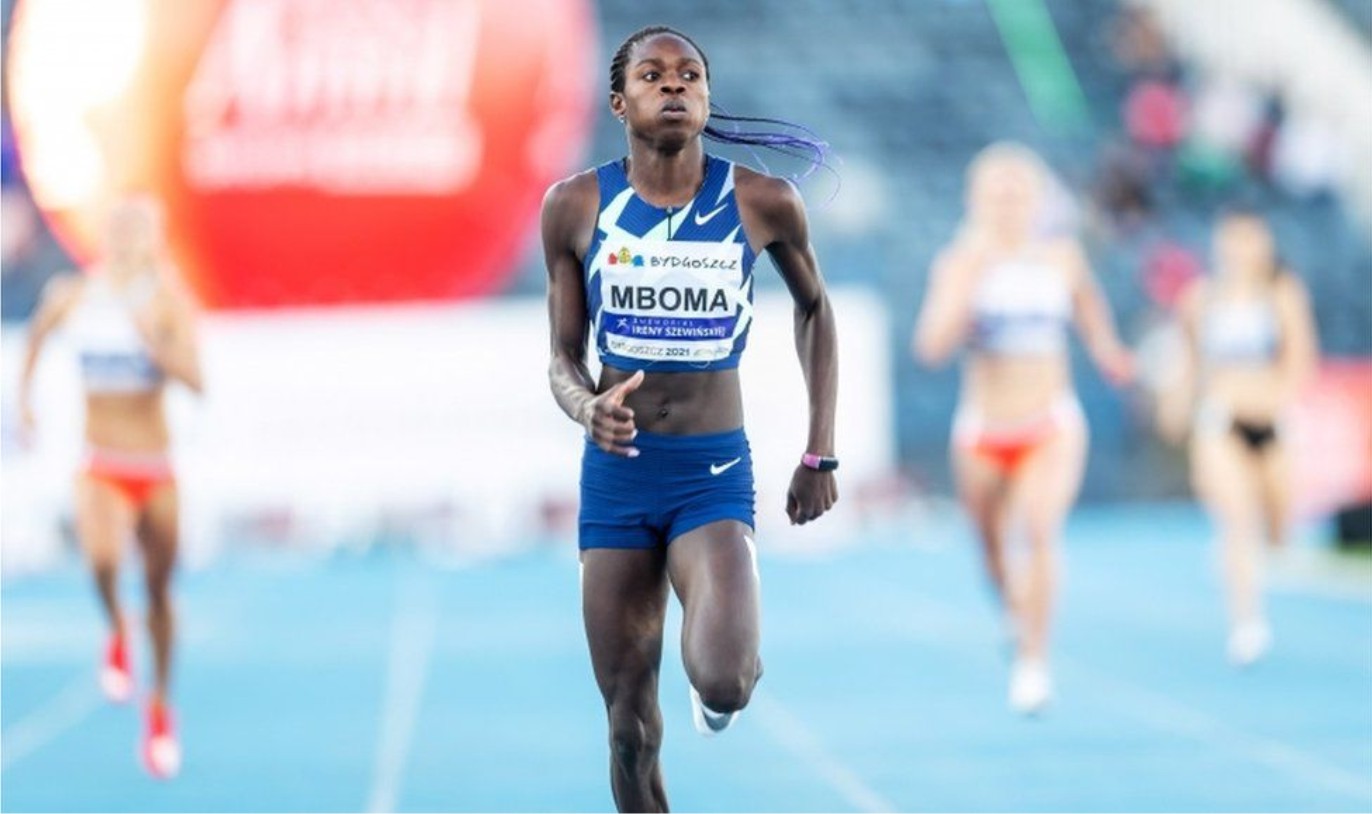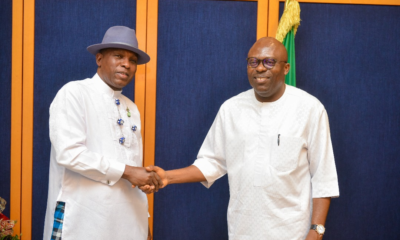Sports
Namibian Teens To Fight Testosterone Ban

Namibian track and field stars Christine Mboma and Beatrice Masilingi, both aged 18, have turned in four of the top five women’s 400m times in the world this year.
They were on a fast-track to Olympic medals, but then their stellar rise came to a sudden halt.
The pair have been banned from competing in the women’s 400m race at the Tokyo Games. The reasoning: their natural testosterone levels are too high.
The teenagers were both racing at international events when they learned the news.
Christine Mboma was with the duo’s coach, Henk Botha, travelling back to their training camp in Italy. When their plane landed, Botha received a call from Namibia’s Olympic Committee relaying the news. By the time he was able to call Beatrice Masilingi, his other trainee, she had already found out from social media.
The revelation came as a shock to both athletes. Neither of them had been tested before, and they had no reason to think their hormone levels were not within the typical range.
It is not the first time female runners have faced this problem. In 2018, Caster Semenya was banned from competing after World Athletics ruled that “to ensure fair competition, women with high natural testosterone levels must take medication to reduce them to compete in middle-distance races”.
But asking someone to take medication to alter something in a body they are happy with is controversial.
“I would ruin the way my body develops because that’ll be something that rearranges everything, how my body functions and everything,” says Masilingi.
“I wouldn’t want to involve any other things because this is the way my body functions in its normal way. And if I try something else, I might get caught somewhere else, and something might go wrong with my body.”
Beatrice Masilingi is concerned about artificially changing her natural hormone balance
Testosterone is a driver of red blood cell count, and the more red blood cells a person has, the more oxygen they can carry to their muscles, allowing them to run faster for longer amounts of time.
Men typically have higher testosterone levels than women, which is one of the reasons why, on average, they outperform women in athletic competition. And if people take testosterone as a performance-enhancing drug, they will generally perform better, says Dr Richard Holt, professor in diabetes and endocrinology at the Faculty of Medicine at the University of Southampton.
Research shows, however, that if you take a group of elite male athletes, all with varying testosterone levels, the ones with higher levels of the hormone do not necessarily perform better than those males with lower levels.
Dr Holt says the same is true of elite female athletes, which is why testosterone cannot be the whole story when it comes to athletic performance.
“There are a number of genetic polymorphisms, slight changes in the genes, that will actually determine whether somebody has that innate ability to be able to compete at the elite level,” he explains.
The problem, though, is where to draw the line between a testosterone advantage and other natural, genetic advantages.
, The author of Sporting Gender, Joanna Harper argues: “If you’re going to pick one advantage to separate the two categories [female and male], you want to pick an advantage that one group has that the other doesn’t. And you pick a biomarker that is widely divergent in the two groups.”
There had to be a line of demarcation at some point, and unfortunately Mboma and Masilingi were on the wrong side.
Harper, a transgender athlete herself, says: “It’s not an elegant solution by any stretch of the imagination, but it places fairly minimal restrictions on people… It’s not elegant, but it’s not, to my mind, horribly unreasonable either.”
Kenyan runner Margaret Wambui says athletics needs a third category beyond men and women.
World Athletics does not attempt to argue that Mboma and Masilingi, and other female athletes with high testosterone levels, are not women.
“We are committed to fairness for women in sport and reject any allegation that biological limits in the female category are based on race or gender stereotypes,” they told Tidesports source in a written statement.
“On the contrary, they provide an objective and scientific measure to define the female category, and are a necessary, reasonable and proportionate means of attaining what both the Court of Arbitration for Sport and the Swiss Federation Tribunal agreed was a legitimate objective.”
But for these two teenagers, a legal ruling on their womanhood is very personal.
“We all come from different areas and are raised differently. It’s just different. We are all created differently, with different purposes. So you can’t compare me with someone else. It’s really unfair,” says Masilingi.
As of now, the young women are not going to take legal action against World Athletics, but they will fight for their right to race.
“We won’t be quiet,” Masilingi concludes. “I’ll say the support system is very strong at the moment. There is a lot of it going on… It’s all over the world and seeing people against this rule and everything, which really means a lot. The love, the coaches, and everyone, it’s just good.”
Sports
Chess Championship: Dan-Jumbo Emerges Best Female Player
The third edition of Naphtail Chess Open Championship which ended on Wednesday in Port Harcourt saw Rivers State born Queen Dan-Jumbo emerged best female player in the tournament following her impressive performance.
It was clash of the Titans as top Chess players in Nigeria gathered to chase honours.
The three days competition was held at Vee Hotel, Trans Amadi ,in Port Harcourt and over 80 players in Nigeria registered for the tournament this championship was recognised by International Chess Federation (FIDE).
Speaking with Tidesports in an exclusive interview on Saturday, Dan-Jumbo said her dream was to become Grand Master in Chess worldwide.
According to her, she started playing Chess at the age of 15 but went into it professionally in 2009 as she represented Rivers State in National Sports Festival (NSF) in Kaduna, the same year.
“I started playing Chess in the early 2000s. I picked the interest through my my elder brother as him and his friends always play Chess in our compound so I began to learn it.
” In 2009 I went to National Sports festival in Kaduna represented Rivers State and I won a silver medal on my board.
“In 2011 and 2012 NSFs I won two Gold medals each hosted by Rivers and Lagos States respectively. While in Edo NSF I won bronze medal” Dan-Jumbo said.
The Asari-Toru, in Rivers State born Chess player use the forum to advice upcoming Chess players to be focus, saying losing a game is part of every competition but the most important thing was that you don’t lose hope.
“My advice for upcoming chess players was that don’t lose focus. Even when you lose, find a way to adjust and get back out”, she added.
Tonye Orabere
Sports
Siasia Blames NFF Over FIFA Ban
Former Super Eagles Coach, Samson Siasia says the Nigeria Football Federation supported FIFA to have him banned for alleged involvement in match-fixing in August 2019.
In a recent interview with Athlist, the 56-year-old, whose ban ends in a few months, said the NFF not only refused to support him but also carried out FIFA’s instruction not to let him know he was under investigation by the world football body.
“Nigeria abandoned me at that time of need; that’s my own take on how this thing played out,” the former Eagles striker and member of the 1994 AFCON-winning squad, said.
“It’s an allegation; they said bribery. What is bribery? Is it not when money changes hands? Was there any proof of that? There were none.
“I spoke with someone who was trying to hire me as a coach in Australia. I didn’t know the guy was a match-fixer, but FIFA knew this guy. Why would they allow him to be around any FIFA tournament?
“So, when they found out through emails, our correspondence about how this guy would take me to Australia, I played in Australia, so I felt it would be nice to go back there.
“We talked about how much salaries, transfers, bonuses, and sign-on fees were, and that was all.
“When FIFA was looking for me, I didn’t even know. I am not affiliated with FIFA; their affiliation is with the NFF. So, they went to the NFF and told them not to let me know that they were investigating me. But if they didn’t tell me, how was I supposed to defend my self Siasia added, “Then they sent me a letter, but it went to my spam. It was two days before the ban that I found out that FIFA was looking for me.
Siasia added, “Then they sent me a letter, but it went to my spam. It was two days before the ban that I found out that FIFA was looking for me.
“Then we started to see how we could communicate with them to see how I could have a hearing. But they said the time had elapsed and I should go to the CAS (Court of Arbitration for Sport).
Sports
WADA Plans Review Of Failed Tests
The World Anti-Doping Agency (WADA) will launch an independent review after 23 Chinese swimmers were cleared to compete at the Tokyo Olympics despite testing positive for a banned substance.
WADA has said it was not in a position to disprove an assertion from the China Anti-Doping Agency (CHINADA) that contamination was the source of the heart medication trimetazidine (TMZ) for which the swimmers tested positive.
Findings of the independent investigation, led by Swiss prosecutor Eric Cottier, are expected to be delivered within two months.
“WADA’s integrity and reputation is under attack,” said Wada president Witold Banka.
“WADA has been unfairly accused of bias in favour of China by not appealing the CHINADA case to the Court of Arbitration for Sport.
“We continue to reject the false accusations and we are pleased to be able to put these questions into the hands of an experienced, respected and independent prosecutor.”
United States Anti-Doping Agency (USADA) Chief Executive Travis Tygart said WADA and CHINADA had swept these positives under the carpet, claims WADA described as completely false and defamatory while adding that it had referred the comments to its lawyers.
Aquatics GB said it was extremely concerned by the allegations, which it said threatened “potential loss of trust and reputational damage to sport”.
WADA was notified of CHINADA’s decision in June 2021, ahead of the delayed Games, and said it had no evidence to challenge China’s findings and that external counsel had advised against appealing.
In addition to the independent investigation, WADA said it will send a compliance audit team to assess the state of China’s anti-doping programme and invite independent auditors “from the broader anti-doping community” to join the trip.
WADA director general Olivier Niggli said: “While not one shred of evidence has been presented to support any of the allegations made against WADA, we wish to deal with the matter as quickly and as comprehensively as possible so that the matter is appropriately handled in advance of the upcoming Paris Olympic and Paralympic Games.”
Details of the positive tests were revealed by the New York Times, which shared reporting with German broadcaster ARD.
China won six swimming medals at the Tokyo Olympics, including three golds.
-
News4 days ago
Reps Order NERC To Suspend Implementation Of New Electricity Tariff
-
Niger Delta4 days ago
Calabar Port Dormant In 25 years -Manager
-
News4 days ago
FG Flags Off PH-Aba Train Service
-

 Featured4 days ago
Featured4 days agoDraw Up Futuristic Policies To Strengthen Governance, Fubara Tells NISS Team …Says Rivers’ll Deploy AI To Drive Dev, Tackle Political Crisis
-
News4 days ago
Drama As Senators Jostle For Seats In Newly Renovated Chamber
-

 Niger Delta4 days ago
Niger Delta4 days agoDiri swears in 14 Commissioners, Revenue Chairman
-

 Nation4 days ago
Nation4 days agoVCDF in Partnership with LDSVA Sensitise Women on Gender Equality, Financial Literacy & Entrepreneurship
-

 Niger Delta4 days ago
Niger Delta4 days agoObaseki Approves N70,000 Minimum Wage For Workers

